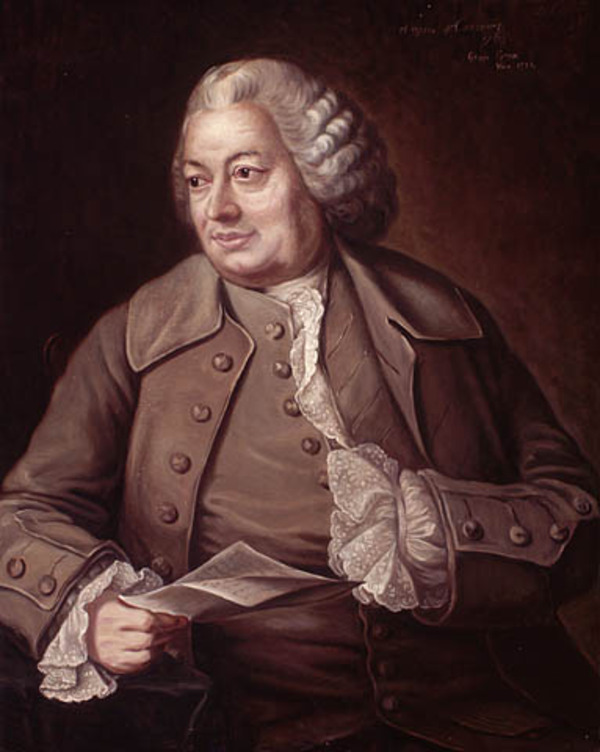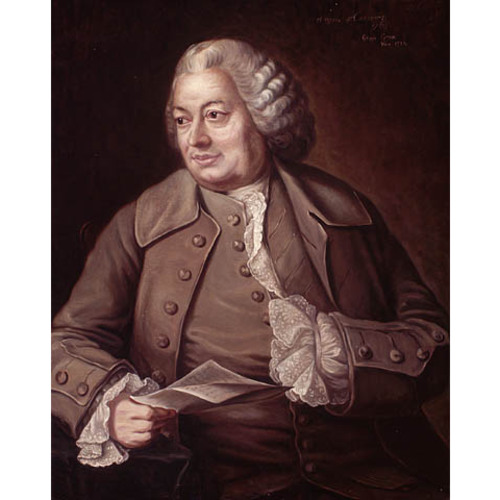PICHON, THOMAS, known as Thomas Tyrell (Thirel, Tirel), colonial official, spy, and author; b. 30 March 1700 at Vire (dept of Calvados), France, son of Jean Pichon, a minor merchant, and Marie Esnault; d. 22 Nov. 1781 at Saint Helier, Jersey.
Thomas Pichon is one of the most intriguing figures in the early history of Canada. For much of his life there is autobiographical material, though what is said about his early career is often contradictory. According to Pichon his parents wanted him to become a priest, but he left school at 14 and went to Paris to study medicine. When his father withdrew his stipend, Pichon was forced to clerk for several lawyers. Later he tutored a seigneur’s children and managed his business affairs. He left this position to aid his father in a complicated law suit which took six years to resolve. His father refused to compensate him, and he resumed his work as a legal secretary. In 1741 he obtained a position, probably as a clerk, in the hospital service of the French armies in Bohemia and Bavaria. Again according to his own account, he became a forage inspector of the army in upper Alsace and in 1745 was appointed to organize hospitals on the Lower Rhine and in the Netherlands, where he met Jean-Louis de Raymond. In 1751 Raymond was appointed governor at Louisbourg and Pichon became his secretary, allured by promises of advancement.
Little is recorded about him during his first two years in the colony. In 1752 he accompanied Raymond on his tour of Île Royale and Île Saint-Jean (Prince Edward Island) and gained the intimate geographical knowledge of the area displayed in the book on Cape Breton he wrote eight years later. He also prepared many of the governor’s reports to France, carefully retaining copies for use in his future publication. Raymond’s promises proved illusory and Pichon became increasingly disenchanted with the governor’s imperious conduct. Raymond recommended him to the minister of Marine for the position of king’s attorney of the Admiralty Court, but was refused. Pichon drew closer to Louisbourg’s financial commissary, Jacques Prevost de La Croix, who granted favours to anyone willing to join his camp against the governor. When Raymond returned to France in 1753, Pichon remained behind. Raymond provided Pichon with a glowing recommendation and asked the minister to send him to Fort Beauséjour (near Sackville, N. B.) as commissary, noting that such an appointment would meet with the approbation of Abbé Jean-Louis Le Loutre. But it was Prevost who dispatched Pichon to Chignecto and requested a commission for him as scrivener and subdelegate of the intendant of New France. Pichon arrived at Beauséjour on 3 Nov. 1753. For the next two years he acted as chief clerk responsible for stores, although his commissions never arrived from France. A man of letters, well versed in the classics, Pichon served as scribe to the commandants, taking down their correspondence, editing it, and improving the grammar. Pichon also helped Le Loutre with his writing, although his suspicions about Roman Catholicism were confirmed by the missionary and he came to despise the priest.
The British commandant at nearby Fort Lawrence, Captain George Scott*, had previously met Pichon at Louisbourg. The boredom of garrison life on the Acadian frontier brought the French and British into frequent contact, and no one noticed when Scott invited Pichon to Fort Lawrence. Scott offered to advance Pichon’s fortune in exchange for information about French activities. Although he later gave several explanations for accepting this overture, Pichon seems to have had little other reason than monetary gain.
For more than a year Pichon practised espionage and subterfuge against the French under the assumed name of Tyrell. He sent Scott and his successor, Captain John Hussey, detailed accounts of French activities in Quebec and Acadia, plans of forts Beauséjour and Gaspereau (near Port Elgin, N.B.), comments on the defences of Louisbourg, copies of official documents, censuses of Acadian refugees, gossip of the French court, and, most commonly, reports on French missionaries and warnings of attacks by Indians and their Acadian allies. Prior to the successful British assault on the French forts of Chignecto in the summer of 1755, Pichon supplied Scott with an outline of the steps necessary for their capture, which Lieutenant-Colonel Robert Monckton later used in the attack. Pichon discouraged the Acadians from joining the Indians and retarded the strengthening of Beauséjour by advising that the British would not attack that year. During the siege he further weakened the French side with his counsel to the Acadian settlers to terminate the ordeal by demanding that the commandant, Louis Du Pont Duchambon de Vergor, capitulate. Pichon also helped draft a letter sent by an Acadian settler to the commandant of Gaspereau, Benjamin Rouer* de Villeray, calling for a swift surrender. While the fighting was going on he wrote a generally accurate and dispassionate journal that was later partially reproduced in his book.
Before the fall of Beauséjour Pichon had made arrangements with the British to continue his spying. As a prisoner in Halifax, he passed on to Archibald Hinchelwood, acting secretary to Charles Lawrence*, some of the correspondence entrusted to him by a captured French naval officer, including a plan for seizing the town; the rest he carried with him to London late in 1755.
In London Pichon continued his duplicity for a short period with some Acadians and attempted to sway the allegiance of Louis-Thomas Jacau de Fiedmont, the artillery officer at Beauséjour. With a pension of £100 sterling he was able to devote much of his time to the preparation of his book, Lettres et mémoires pour servir à l’histoire naturelle, civile et politique du Cap Breton, depuis son établissemént jusqu’à la reprise de cette isle par les Anglois en 1758, which appeared in 1760. Based on previous writings and composed in the form of letters to a friend, the book is a generally accurate but uneven description of Île Royale and Île Saint-Jean. His account of the customs and behaviour of the Micmacs and Malecites is strikingly realistic, but his discussion of the role of the missionaries is marked by a sneering contempt for the Roman Catholic Church, appropriate to an Enlightenment mind. His views on colonial government are distorted by his supposition that the bitter political factionalism of the Raymond-Prévost years characterized all adminstrations. The remainder of the book, concerned mainly with the military events he witnessed, presents little that is new or revealing. The work remains, nevertheless, one of the few reliable published sources about the French in Acadia during the 18th century.
During his early life in Paris Pichon had acquired an unsavoury reputation as a seducer of young women, and after his arrival in London, undeterred by age, he became involved in a series of amorous adventures. The most tortuous involved Marie-Barbe de Beaumont, née Le Prince, a novelist and the editor of a children’s magazine, whose marriage had been annulled. Her infatuation with Pichon was more intense than his devotion to her; they never married, but Pichon moved into her apartment in 1757 and continued to reside there after she left England in 1760. Unable to speak English, Pichon lived in a restricted circle, but in the 1760s he took several mistresses and became a friend of John Cleland, the author of Fanny Hill, or the memoirs of a woman of pleasure. Some time after 1769 Pichon moved to Saint Helier. Pichon left as a legacy to his Norman birthplace all his letters, manuscripts, and a library of over 3,000 volumes, mainly works of history, science, and political economy.
Assessments of Thomas Pichon have been universally harsh. The tone of exaggerated self-importance struck in his correspondence, his ambition and avarice, his treason, and his sexual promiscuity have all led to condemnation. Pichon himself, always dissatisfied with his lot in life, was to end in mortification of spirit over his betrayal of his country. He desired to be loved, but was incapable of truly loving.
During his last years the sins and excesses of his former life overwhelmed Pichon and led to a profound spiritual crisis. Lonely and tormented, he was repulsed by the physical deterioration that accompanied his advancing years. “What a horrible thing is old age!” he wrote. “The sprightliness of my senses is worn by time, maybe by debauchery, and as they say, for having lived too much. My infirmities are constantly increasing, and my days and nights are spent in unbearable torment. My legs, once my adornment and the object of admiration at balls and gatherings, are stretched, swollen and immobile, on a chair or footstool. My cheeks, once glowing and plump, are parched and shrivelled with wrinkles; my lips are covered with tense and livid skin. I have lost, not only the power to enjoy pleasure, but the desire for enjoyment.”
The thought of death confused and frightened Pichon even more. Having rejected religion, he found reason an uncomforting solace with which to meet that fate he had once ridiculed as an illusion. “I tremble in spite of myself,” he wrote, “before something that threatens and which, in vain, I strive not to believe.” He contemplated suicide and turned in desperation to God, dying as a Protestant. His anguish was best expressed in the epitaph he wrote for himself: “Dear God, who regards this world and the anxieties of men, take pity on my soul.” But Pichon also hoped that others might learn from his example “whether or not it beseems a man of sense to live according to a system in which he does not dare to die.”
Thomas Pichon is the author of Lettres et mémoires pour servir à l’histoire naturelle, civile et politique du Cap Breton, depuis son établissement jusqu’à la reprise de cette isle par les Anglais en 1758 (La Haye, Pays Bas, 1760; réimpr. [East Ardsley, Eng.], 1966).
AD, Calvados (Cæn), F, 1894 (fonds Surlaville) (mfm. at PAC). AN, Col., C11B, 31, f.51v; 33, f.70; 34, f.167v. Bibliothèque municipale de Vire (dép. du Calvados), Coll. Thomas Pichon, 1750–62 (transcripts at PAC). BL, Add. mss 19071, pp.141–42 (transcript in PAC, MG 21). PANS, RG 1, 341–41 1/2 (Thomas Pichon papers). Les derniers jours de l’Acadie (Du Boscq de Beaumont). [L.-T. Jacau de Fiedmont], The siege of Beauséjour in 1755; a journal of the attack on Beauséjour . . . , ed. J. C. Webster, trans. Alice Webster (Saint John, N.B., 1936). Military affairs in North America, 1748–65 (Pargellis). Pierre Bagot, Marie Le Prince de Beaumont, lettres à Thomas Pichon (Vire, France, 1924). J. C. Webster, Thomas Pichon, “the spy of Beausejour,” an account of his career in Europe and America . . . ([Sackville, N.B.], 1937). Albert David, “Le Judas de l’Acadie,” Revue de l’université d’Ottawa, III (1933), 492–513; IV (1934), 22–35; “Thomas Pichon, le `Judas’ des Acadiens (1700–1781),” Nova Francia (Paris), III (1927–28), 131–38. Gustave Lanctot, “Le traître Pichon,” BRH, XXXVI (1930), 328–40. Régis Roy, “Thomas Pichon,” BRH, V (1899), 92–93.
Cite This Article
T. A. Crowley, “PICHON, THOMAS (Thomas Tyrell (Thirel, Tirel)),” in Dictionary of Canadian Biography, vol. 4, University of Toronto/Université Laval, 2003–, accessed March 29, 2025, https://www.biographi.ca/en/bio/pichon_thomas_4E.html.
The citation above shows the format for footnotes and endnotes according to the Chicago manual of style (16th edition). Information to be used in other citation formats:
| Permalink: | https://www.biographi.ca/en/bio/pichon_thomas_4E.html |
| Author of Article: | T. A. Crowley |
| Title of Article: | PICHON, THOMAS (Thomas Tyrell (Thirel, Tirel)) |
| Publication Name: | Dictionary of Canadian Biography, vol. 4 |
| Publisher: | University of Toronto/Université Laval |
| Year of revision: | 1979 |
| Access Date: | March 29, 2025 |




